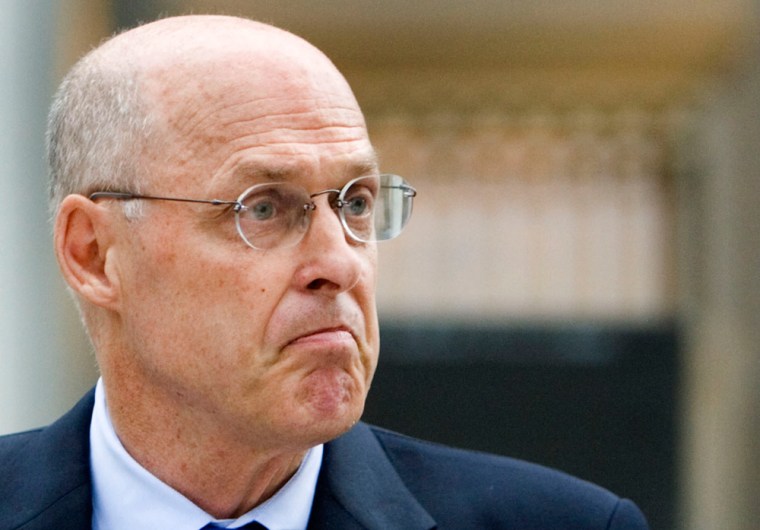Scrambling to bolster eroding investor confidence, the Federal Reserve and the Treasury Department announced unprecedented steps to brace slumping mortgage giants Fannie Mae and Freddie Mac.
The companies’ shares, which have plunged as losses from their mortgage holdings threatened their financial survival, opened higher Monday. Fannie Mae rose 27 cents to $10.53, while Freddie Mac climbed 34 cents to $8.08.
The plan, unveiled Sunday, is intended to signal the government is prepared to take all necessary steps to prevent the credit market troubles that erupted last year with losses from subprime mortgages from engulfing financial markets.
The Fed said it granted the Federal Reserve Bank of New York authority to lend to the two companies “should such lending prove necessary.” They would pay 2.25 percent for any borrowed funds — the same rate given to commercial banks and big Wall Street firms.
The Fed said this should help the companies’ ability to “promote the availability of home mortgage credit during a period of stress in financial markets.”
Secretary Henry Paulson said the Treasury is seeking expedited authority from Congress to expand its current line of credit to the two companies and buy shares of the companies — if needed.
“Fannie Mae and Freddie Mac play a central role in our housing finance system and must continue to do so in their current form as shareholder-owned companies,” Paulson said Sunday. “Their support for the housing market is particularly important as we work through the current housing correction.”
The Treasury’s plan also seeks a “consultative role” for the Fed in any new regulatory framework eventually decided by Congress for Fannie and Freddie. The Fed’s role would be to weigh in on setting capital requirements for the companies.
Rep. Barney Frank, D-Mass., the Financial Services Committee chairman, said the House would move by the end of the week to fold “the essence” of Treasury’s proposal into a sweeping housing package, with the goal of clearing it for President Bush by the end of next week.
That package includes a foreclosure rescue to help strapped homeowners get new, more affordable government-backed mortgages through the Federal Housing Administration, and creates a new regulator and tighter controls for Fannie Mae and Freddie Mac.
Frank said he expected only minor changes, if any, to Treasury’s proposal, and said Congress would not seek to impose monetary limits on the government’s line of credit.
Sen. Christopher Dodd, chairman of the Senate Banking Committee, on Monday called the Bush administration’s actions Sunday “probably the right steps” and said he will summon Paulson, Fed Chairman Ben Bernanke and Securities and Exchange Commission chairman Christopher Cox to a committee hearing to answer questions.
“What’s important here as well is to calm people’s fears,” Dodd said in an interview on CBS’ “The Early Show.”
He also drew a distinction between last week’s failure of IndyMac — which engaged in originating riskier mortgages than traditional community and regional banks — and the two mortgage giants.
“There’s a big difference between IndyMac and Fannie and Freddie,” Dodd said. “IndyMac engaged in very bad mortgages, luring people into deals they could never afford. That’s not the case with Fannie and Freddie.” Dodd said that while there may be more bank failures, “I’m more optimistic about Fannie and Freddie than I am about these banks.”
The White House, in a statement, said President Bush directed Paulson to “immediately work with Congress” to get the plan enacted. It also said it believed the steps outlined by Paulson “will help add stability during this period.”
Investors may not be as sanguine, however, according to Chris Johnson, an investment manager and president of Johnson Research Group in Cleveland. Stocks of financial institutions “are going to get clobbered,” he predicted. “It is a situation where regulators and the government are trying to play catch up, and that means everything is not discounted in the stock prices yet.”
The Dow Jones industrials on Friday briefly fell below 11,000 for the first time in two years and Johnson said shares of investment banks and regional banks could move even lower as investors react to this weekend’s developments.
Fannie Mae and Freddie Mac hold or back $5.3 trillion of mortgage debt, about half the outstanding mortgages in the United States.
The government denied it, but what has been seen by investors as an implicit guarantee of support has allowed Fannie and Freddie over the years to borrow at rates only slightly higher than the Treasury — and lower than what their banking competitors had to pay.
“This really blows away the notion of an implicit guarantee,” independent banking consultant Bert Ely said of the Treasury’s plan to ask Congress to allow it to make equity investments in Fannie Mae and Freddie Mac. “It suggests a greater concern about how these companies are doing. It says the problems are deeper. It gets to the solvency of the companies, not just the liquidity.”
Senate Majority Leader Harry Reid, D-Nev., said “Senate Democrats stand ready to work with the administration to quickly and effectively address the situation currently facing these institution.”
House GOP leader John Boehner, R-Ohio, and Republican Whip Roy Blunt, R-Mo., said they “stand ready to work with Secretary Paulson and congressional Democrats to take appropriate steps to ensure the soundness of our mortgage markets.”
Democratic presidential contender Barack Obama said the government’s main concern should be “to make sure that home ownership remains attainable and affordable for American families. Second, any measures should protect taxpayers and not bailout the shareholders and management of Fannie Mae and Freddie Mac.”
Republican rival John McCain believes the measures announced Sunday “are consistent with the goal of providing support for a path through the current duress toward steps that include regulatory reform, market discipline and mission focus,” said Douglas Holtz-Eakin, senior policy adviser.
